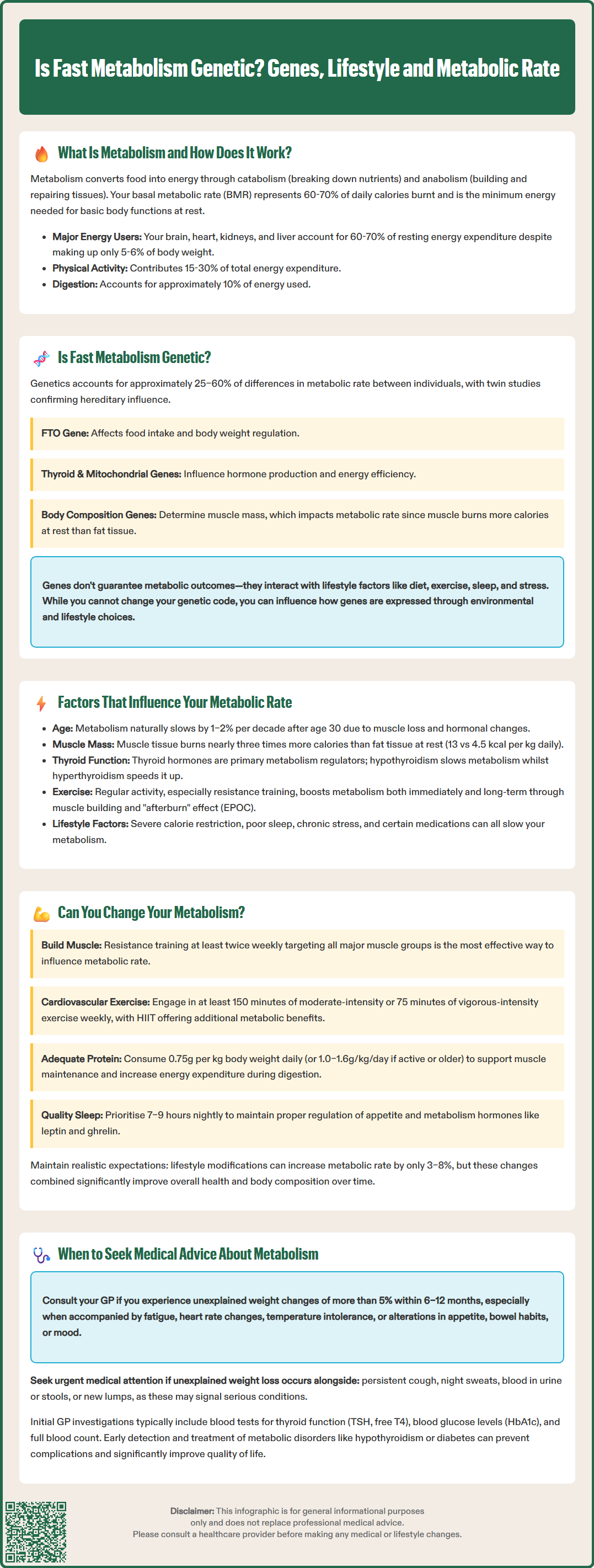
Many people wonder whether their metabolic rate is predetermined by their genes or influenced by lifestyle factors. Metabolism—the process by which your body converts food into energy—varies considerably between individuals, with some people appearing to burn calories more rapidly than others. Research demonstrates that genetics does play a significant role in determining metabolic rate, accounting for approximately 25–60% of individual variation. However, genetic inheritance is not the sole determinant. Environmental factors, body composition, hormonal status, physical activity, and dietary habits all interact with your genetic blueprint to influence how efficiently your body burns calories. Understanding these factors can help you make informed decisions about your health and weight management.
Quick Answer: Genetics accounts for approximately 25–60% of individual variation in metabolic rate, though environmental and lifestyle factors also significantly influence metabolism.

Mounjaro® is the most innovative GLP-1 medication proven to dramatically curb appetite, hunger, and cravings to help professional men achieve substantial weight loss.
Start Here
Wegovy® is a weekly injectable GLP-1 medication with proven effectiveness in reducing appetite, hunger, and cravings to help busy professionals lose significant weight.
Start HereMetabolism refers to the complex network of biochemical processes that occur within your body to maintain life. These processes convert the food and drink you consume into energy, which your body uses for everything from breathing and circulating blood to repairing cells and maintaining body temperature. Your metabolic rate is the speed at which these processes occur, determining how many calories your body burns at rest and during activity.
Your metabolism comprises two main components: catabolism and anabolism. Catabolism breaks down nutrients from food—carbohydrates, proteins, and fats—into smaller molecules, releasing energy in the process. This energy is stored in adenosine triphosphate (ATP), the body's primary energy currency. Anabolism uses this energy to build and repair tissues, synthesise hormones, and support growth. These processes work continuously, even when you're sleeping.
Basal metabolic rate (BMR) accounts for approximately 60–70% of your total daily energy expenditure for most people. This represents the minimum energy required to keep your body functioning at rest, measured under standardised conditions. Resting metabolic rate (RMR), often used interchangeably with BMR, is slightly higher as it's measured under less strict conditions. The remaining energy expenditure comes from physical activity (15–30%) and the thermic effect of food—the energy needed to digest, absorb, and process nutrients (approximately 10%). Several organs contribute significantly to BMR, with the brain, heart, kidneys, and liver accounting for about 60–70% of resting energy expenditure, despite representing only about 5–6% of total body weight.
Individual metabolic rates vary considerably between people. Some individuals appear to burn calories more rapidly—often described as having a 'fast metabolism'—whilst others have a slower metabolic rate. Understanding the factors that influence these differences, including genetic components, can help explain why people respond differently to the same diet and exercise regimens.

Yes, genetics plays a significant role in determining your metabolic rate, though it is not the sole factor. Research indicates that genetic variation accounts for approximately 25–60% of the differences in basal metabolic rate between individuals, with considerable variability between studies. Twin studies have been particularly illuminating, demonstrating that identical twins tend to have more similar metabolic rates than fraternal twins, even when raised in different environments, suggesting a hereditary component.
Several specific genes have been identified that influence metabolic function. The FTO gene (fat mass and obesity-associated gene) is one of the most studied, with certain variants primarily associated with increased food intake and body mass index, with more modest or indirect effects on energy expenditure. Other genes affect thyroid hormone production, which directly regulates metabolic rate. Variations in genes encoding uncoupling proteins (UCPs), particularly UCP1, UCP2, and UCP3, may influence mitochondrial energy efficiency, though evidence for their effects on whole-body metabolism in humans remains inconsistent.
Your genetic inheritance also influences body composition, which significantly impacts metabolic rate. Muscle tissue is metabolically active, burning more calories at rest than fat tissue. Individuals who genetically tend towards greater muscle mass will naturally have higher metabolic rates. Similarly, genetic factors influence where your body stores fat and how readily it mobilises fat stores for energy.
However, having genes associated with a faster or slower metabolism does not guarantee a particular outcome. Genetic predisposition interacts with environmental and lifestyle factors to determine your actual metabolic rate. Epigenetic modifications—changes in gene expression without altering the DNA sequence itself—can be influenced by diet, exercise, sleep, and stress. This means that whilst you cannot change your genetic code, you can influence how those genes are expressed and, consequently, how your metabolism functions.
Beyond genetics, numerous factors influence your metabolic rate, many of which are modifiable through lifestyle choices. Age is a significant determinant: metabolic rate typically decreases by approximately 1–2% per decade after age 30, primarily due to loss of muscle mass and hormonal changes. This age-related decline is partly why maintaining a healthy weight becomes more challenging as you grow older.
Body composition profoundly affects metabolism. Muscle tissue requires more energy to maintain than fat tissue, burning approximately 13 kcal per kg daily at rest, compared to about 4.5 kcal per kg for fat tissue. Consequently, individuals with higher muscle mass have elevated basal metabolic rates. This explains why men typically have faster metabolisms than women—they generally possess greater muscle mass and lower body fat percentages.
Hormonal status critically regulates metabolic function. Thyroid hormones (thyroxine and triiodothyronine) are primary metabolic regulators, with hypothyroidism causing metabolic slowdown and hyperthyroidism accelerating it. Other hormones including cortisol, insulin, growth hormone, and sex hormones (oestrogen and testosterone) also influence energy expenditure. Conditions affecting these hormones, such as polycystic ovary syndrome (PCOS) or Cushing's syndrome, can significantly alter metabolic rate.
Physical activity level affects both immediate calorie burning and long-term metabolic rate. Exercise increases energy expenditure during the activity itself and can elevate metabolism for hours afterwards—a phenomenon called excess post-exercise oxygen consumption (EPOC). Regular physical activity, particularly resistance training, builds muscle mass, thereby increasing basal metabolic rate.
Other influential factors include:
Dietary habits: Severe calorie restriction can slow metabolism as the body adapts to conserve energy
Sleep quality: Poor sleep disrupts hormonal regulation and can reduce metabolic rate
Stress levels: Chronic stress elevates cortisol, which can affect metabolism and fat storage
Medications: Certain drugs, including some antidepressants, antipsychotics, and beta-blockers, may influence metabolic rate
Environmental temperature: Cold exposure can temporarily increase metabolism as the body works to maintain core temperature
Whilst you cannot alter your genetic blueprint, you can influence your metabolic rate through evidence-based lifestyle modifications. The most effective approach involves building and maintaining muscle mass through regular resistance training. Strength training exercises—using weights, resistance bands, or bodyweight—stimulate muscle protein synthesis and increase lean body mass. The UK Chief Medical Officers' Physical Activity Guidelines recommend adults engage in muscle-strengthening activities on at least two days per week, targeting all major muscle groups.
Cardiovascular exercise also contributes to metabolic health. High-intensity interval training (HIIT) has been shown to produce a more pronounced EPOC effect than steady-state cardio, though the magnitude of this effect is typically modest. However, any regular physical activity is beneficial—the UK guidelines recommend at least 150 minutes of moderate-intensity aerobic activity or 75 minutes of vigorous-intensity activity weekly, as outlined on the NHS website.
Dietary strategies can support metabolic function, though their effects are often modest. Eating adequate protein supports muscle maintenance and has a higher thermic effect than carbohydrates or fats, meaning your body uses more energy to digest it. The UK Reference Nutrient Intake (RNI) for protein is 0.75g per kg of body weight daily for the general adult population, though active individuals and older adults may benefit from higher intakes (1.0–1.6g/kg/day). If you have kidney disease, consult your GP or a dietitian before increasing protein intake. Avoiding severe calorie restriction is important, as prolonged low-calorie diets can trigger adaptive thermogenesis—a metabolic slowdown that makes further weight loss difficult.
Optimising sleep is crucial for metabolic health. Sleep deprivation disrupts hormones that regulate appetite and metabolism, including leptin and ghrelin. Adults should aim for 7–9 hours of quality sleep nightly. Managing stress through techniques such as mindfulness, yoga, or cognitive behavioural therapy can help regulate cortisol levels and support metabolic function.
It's important to maintain realistic expectations. Whilst these interventions can modestly increase metabolic rate—perhaps by 3–8% depending on individual factors—they won't dramatically transform a naturally slower metabolism into a fast one. However, these changes, combined with appropriate dietary habits, can significantly impact overall health, body composition, and weight management over time.
You should consult your GP if you experience unexplained changes in weight despite consistent diet and exercise habits. Sudden, unintentional weight loss or gain—particularly if accompanied by other symptoms—may indicate an underlying metabolic or endocrine disorder requiring investigation. Thyroid dysfunction is relatively common, affecting approximately 2% of the UK population, and can significantly alter metabolic rate.
Symptoms warranting medical evaluation include:
Unexplained weight changes (loss or gain of more than 5% of body weight within 6–12 months)
Persistent fatigue or weakness despite adequate rest
Changes in heart rate (unusually fast or slow)
Heat or cold intolerance
Changes in appetite, bowel habits, or menstrual patterns
Excessive thirst or urination
Mood changes, anxiety, or depression
Hair loss, dry skin, or brittle nails
Muscle weakness or tremors
Seek urgent medical advice if unexplained weight loss is accompanied by additional symptoms such as persistent cough, night sweats, blood in urine or stools, or a new lump or mass, as these may indicate serious conditions requiring prompt assessment.
Your GP will typically begin with a thorough history and physical examination. Initial investigations may include blood tests to assess thyroid function (thyroid-stimulating hormone, free T4), blood glucose levels (HbA1c or fasting plasma glucose), and full blood count. Depending on findings, further tests might examine cortisol levels, sex hormones, or other endocrine markers. NICE guidelines (NG145 for thyroid disease, NG28 for diabetes) provide clear pathways for investigating suspected metabolic and endocrine disorders.
Certain populations should be particularly vigilant. Individuals with a family history of thyroid disease, diabetes, or other metabolic conditions have increased risk. Women are more susceptible to thyroid disorders, particularly during pregnancy and menopause. If you're taking medications that might affect metabolism, discuss any concerns with your GP or pharmacist.
Early identification and management of metabolic disorders can prevent complications and significantly improve quality of life. Conditions such as hypothyroidism are readily treatable with levothyroxine replacement therapy, whilst diabetes requires comprehensive management to prevent long-term complications. Don't hesitate to seek medical advice if you have concerns about your metabolism—your healthcare team can provide appropriate assessment, diagnosis, and evidence-based treatment options tailored to your individual circumstances.
Yes, you can inherit metabolic tendencies from your parents, as genetics accounts for approximately 25–60% of individual variation in basal metabolic rate. Twin studies show identical twins have more similar metabolic rates than fraternal twins, even when raised separately, confirming hereditary influence.
Several genes influence metabolism, including the FTO gene (associated with body mass index and food intake), genes regulating thyroid hormone production, and genes encoding uncoupling proteins (UCP1, UCP2, UCP3) that affect mitochondrial energy efficiency. Genetic variations also influence body composition, which significantly impacts metabolic rate.
Whilst you cannot change your genetic code, lifestyle modifications can influence how genes are expressed and improve metabolic function. Regular resistance training, adequate protein intake, quality sleep, and stress management can modestly increase metabolic rate and significantly impact overall health and body composition over time.
All medical content on this blog is created based on reputable, evidence-based sources and reviewed regularly for accuracy and relevance. While we strive to keep content up to date with the latest research and clinical guidelines, it is intended for general informational purposes only.
DisclaimerThis content is not a substitute for professional medical advice, diagnosis, or treatment. Always consult a qualified healthcare professional with any medical questions or concerns. Use of the information is at your own risk, and we are not responsible for any consequences resulting from its use.